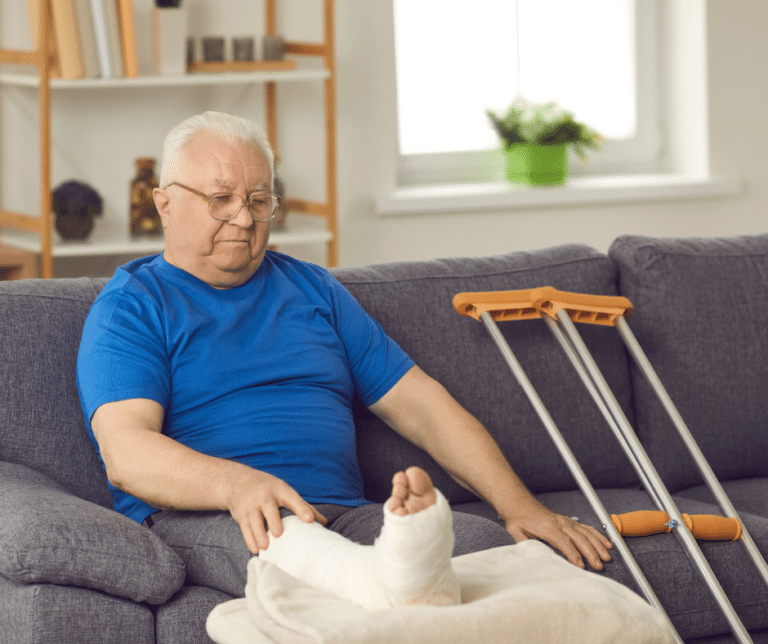Accidents are never easy, particularly for seniors. It can be quite overwhelming to learn that a loved one needs a cast, especially if they live on their own or have other medical conditions going on at the same time. However, getting through the healing process can be easier and more comfortable with support from loved ones and companion care at home.
Understanding the Challenges
First, it’s critical to comprehend the difficulties seniors may experience with cast use. Aging bodies frequently have their own unique set of complications, including decreased mobility, sluggish healing, and preexisting medical issues. These elements may make wearing a cast more uncomfortable and frustrating. Not only that, but many seniors are inclined to not ask for help, which can make the challenges even more difficult. Those challenges increase again when, as mentioned, seniors live alone or, worse yet, live far away from loved ones. It’s during these times that companion care at home truly shines, providing much-needed support for seniors.
Helping Seniors Acclimate to Wearing a Cast
Seniors should be encouraged to follow the instructions provided by the medical team. Additionally, companion care at home can assist them with the following tips:
- Keep it Elevated: Keeping the injured limb elevated can help lessen pain and swelling. When seniors are resting or lying down, they should be encouraged to elevate their cast limb on pillows.
- Maintain Hygiene: In order to avoid infections and encourage healing, it is essential to keep the cast dry and clean. However, this doesn’t mean that seniors should shy away from maintaining a regular hygiene routine. With companion care at home’s help, they can adhere to any special care instructions given by their healthcare provider and still shower or bathe regularly.
- Wear Comfortable Clothing: Wearing loose-fitting clothing can help accommodate the majority of the cast. Seniors should choose breathable, soft materials that won’t aggravate skin irritation or add to discomfort.
- Keep Moving (But Don’t Overdo It): Gentle movement and exercises prescribed by healthcare professionals can help prevent stiffness and promote circulation, even though rest and allowing the body to heal are crucial.
- Offer Emotional Support: Managing an injury can have a negative impact on mental health, particularly for seniors who may be juggling additional age-related issues. Throughout the healing process, loved ones should focus on being understanding and patient, lend a sympathetic ear, and offer assurance.
- Help with Daily Tasks: As mentioned, seniors may need assistance with daily tasks like cooking, cleaning, and personal grooming, depending on the extent of their injury and their level of mobility. Companion care at home is the perfect solution in this scenario.
- Explore Mobility Aids: When a senior is wearing a cast, mobility aids like wheelchairs, walkers, and crutches can give them the support they need to get around safely. Before attempting to use these aids, seniors will need proper instruction to ensure they’re the right fit and that they don’t injure themselves further by using them the wrong way.
- Promote Social Interaction: When seniors feel isolated or confined as a result of an injury, depression and feelings of loneliness can worsen. It’s important for them to maintain in-person or virtual relationships with friends and family as much as possible. Also, this is another great reason to consider companion care at home, as they offer built-in interaction.
While living with a cast can be difficult, seniors can recover more easily if they receive the proper assistance from companion care at home.
If you or an aging loved one are considering Companion Care at Home in Douglasville, GA, please contact the caring staff at Arose Home Care Services LLC today at (404) 720-5385
At Arose Home Care Services, LLC, we provide exceptional medical and non-medical home care for seniors and families in Carrollton, Marietta, Douglasville, Acworth, Fayetteville, Powder Springs, Hiram, Lithia Springs, Stone Mountain, Kennesaw, Atlanta, and the surrounding areas in Georgia.
- What is Skilled Nursing at Home and How Does This Type of Care Help Seniors? - July 23, 2024
- Healthy Tips for Senior Men - July 8, 2024
- What are the Requirements for Veterans to Rely on Aid and Attendance? - June 19, 2024




